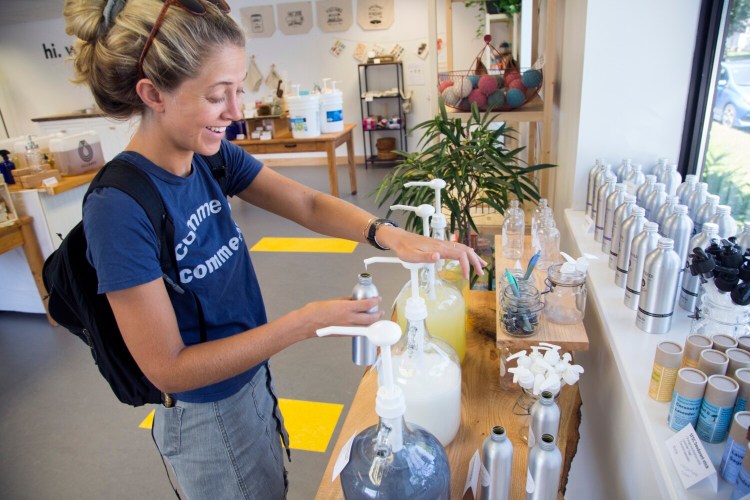We are in the midst of a global plastic pollution crisis. Our reliance on single-use plastic and goods packaged in plastic has created a catastrophe for waste management facilities and recycling efforts – and for oceans and marine life as well.
The weakening of recycling programs across Maine and the world has captured the attention of consumers, causing them to focus on the waste (specifically single-use plastic) from their homes and businesses as a way to combat climate change and protect Mother Nature. Terms like “zero-waste” and “plastic-free” are becoming more popular, and consumers are increasingly likely to eye their purchases through an environmental lens. This is why I’m writing in support of L.D. 1933, An Act to Promote Bulk Retail Purchasing, sponsored by Rep. Victoria Morales, D-South Portland.
The hierarchy of waste that we all know is “reduce, reuse, recycle.” But that is being updated now, to include “refuse” as a first step. People around the world, and many in Maine, are actively trying to refuse single-use plastics. Simple ways they can do this are to bring their own bags to the grocery store, bring their own utensils to avoid plastic forks, refuse plastic straws and refill what containers they can with bulk foods and goods. That’s where L.D. 1933 comes into play. L.D. 1933 aims to make refilling your own containers more widely accepted at grocery stores.
Industrial ecologist Roland Geyer, of the University of California at Santa Barbara, has found that 40 percent of all plastic produced comes from packaging – which is single-use, meaning used once and then sent into the waste stream. With people considering their waste as a part of living an environmentally friendly lifestyle, people are looking for ways to refill and reuse existing packaging and ditch plastic once and for all.
I am acutely aware of these trends because I started GoGo Refill, New England’s first zero-waste store, in July right here in South Portland. Since we opened we’ve helped nearly 3,000 people who are trying to reduce their reliance on single-use plastic. At our store, we sell home and body products, like laundry detergent, dish soap and shampoo and conditioner – allowing customers to bring in and refill their containers.
Another area that people struggle to avoid plastic packaging is food shopping. Most food items are packaged in plastic, and even when a store has a bulk section, they may not let you fill your own containers from their bulk bins. I hear every day from my customers that they are frustrated by grocery stores telling them that they must use the new packaging provided, instead of filling up their mason jars or bulk bags. L.D. 1933 will make the rules around refilling your own existing food containers clear to consumers and stores alike, making it easier for shoppers to refuse plastic packaging.
Why are so many people ready to ditch plastic?
• Over 9 billion tons of plastic have been created since the 1950s, according to a study by Geyer, the industrial ecologist, and other researchers.
• Only 9 percent of plastic is recycled, the same study found, and only 1 percent of that is recycled again.
• Plastic doesn’t really recycle, it downcycles, turning into products and packaging that are downgraded, and harder to recycle a second time (as opposed to aluminum and glass, which are infinitely recyclable).
• Plastic breaks down into microplastics in the environment, making cleanup nearly impossible and microplastics are easily mistaken for food and ingested by marine animals and birds.
• Over 18 billion pounds of plastic flow into the ocean every year from coastal regions, University of Georgia environmental engineering professor Jenna R. Jambeck has found.
• The U.S. alone throws away 38 billion plastic bottles every year. That is 2.2 million tons of plastic going into U.S. landfills.
• About 8 percent of the world’s oil production is used to make plastic, according to a 2016 report by the Ellen MacArthur Foundation, and that figure is projected to rise to 20 percent by 2050.
It is time to make it easy for Maine residents to pursue plastic-free living. Please join me in supporting L.D. 1933 by submitting your comments to the Legislative Committee on Innovation, Development, Economic Advancement and Business (IDEA) for its Jan. 30 hearing.
Send questions/comments to the editors.



Success. Please wait for the page to reload. If the page does not reload within 5 seconds, please refresh the page.
Enter your email and password to access comments.
Hi, to comment on stories you must . This profile is in addition to your subscription and website login.
Already have a commenting profile? .
Invalid username/password.
Please check your email to confirm and complete your registration.
Only subscribers are eligible to post comments. Please subscribe or login first for digital access. Here’s why.
Use the form below to reset your password. When you've submitted your account email, we will send an email with a reset code.